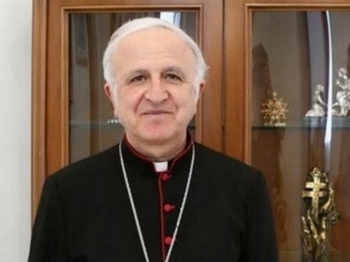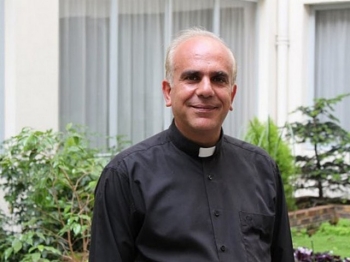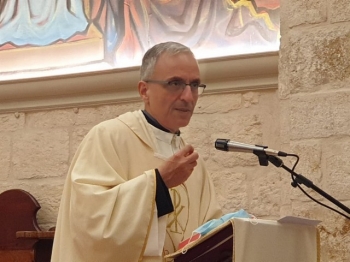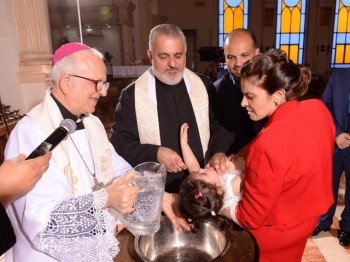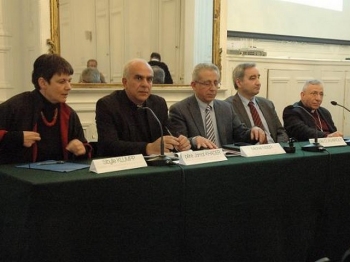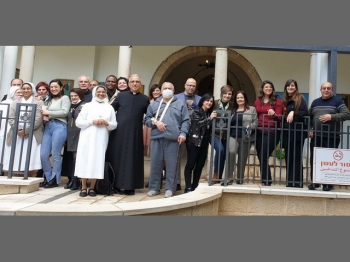Mgr. William Shomali: I thank the Lord for the four and a half years of service I spent in Jordan. I was able to get to know the other part of the diocese better, which has the majority of our faithful of the Latin rite. I remember full churches, especially on Sunday and Saturday evenings. I treasure the memory of the beautiful choirs, especially of Tla el Ali, of Webdeh, of the school of Shmeisani, of Sweifieh, of Zarka, of Madaba and of Jubeiha… I keep in my heart the image of the new parish church of Jubeiha, built with the help of the Knights and Dames of the Order of Holy Sepulchre, a church that can accommodate 1,000 people seated. It is the largest and most beautiful church in Jordan! Thank you to the Knights and Dames of the Order and to the Grand Magisterium. I will not forget the effective collaboration between our priests, our deacons and our acolytes, nor the warm farewell of the faithful and friends who came to the Vicariate before my departure to greet my successor, Father Jamal Daibes, and me.
I would like to thank the Lord who supported me, especially in the following initiatives. As soon as I arrived in Jordan, I learned of a big problem between two Christian tribes in the south. There were death threats, a spirit of revenge and diabolical divisions between them. Thanks to the Latin Vicariate of Amman and a group of priests from the Patriarchate who took the lead in reconciliation, this story ended well. I do not have time to go into detail here but would refer our readers to the Patriarchate website (https://www.lpj.org/fr/posts/reconciliationhistorique-entre-deux-grandes-familleschretiennes-de-jordanie.html).
Eight permanent deacons help the priests in various parishes. We felt the need to have acolytes to distribute communion during Sunday masses and, on the first Friday of the month, to the sick. Twenty-one candidates came forward. After a yearlong preparation, they received the ministry of lectors and acolytes. These acolytes, all married and active, are young, enthusiastic and give pleasure through their voluntary work.
In 2017, we were able to reactivate the Council of Heads of Churches in Jordan. Bishops and church representatives meet six times a year to discuss challenges facing Christians. Together we were able to deal with the pandemic, especially with regard to the opening and closing of prayer houses, work together on a catechism book that will be submitted to the government with a view to teaching it to all Christian students at private and public schools. We have also obtained from the government a piece of land, which will become a cemetery for Christians in the northern area of Amman...
Jordan has eleven million inhabitants less than 2% of whom are Christians. The others are Sunni Muslims. One of the forums for dialogue is the Royal Institute for Interreligious Dialogue, founded and chaired by Prince Hassan Bin Talal, uncle of the current king. According to tradition, the Latin bishop of Amman is the vice-president of the Institute. This is an opportunity to remember the support that the royal family gives to the Christian minority in Jordan. Many interreligious meetings have taken place between this royal Institute and the Pontifical Council for Interreligious Dialogue. Dialogue is important in this period marked by Muslim radicalism and political Islam.
Because of the debts that stigmatised the American University of Madaba (AUM) during its construction and which the Patriarchate had to pay for by selling land, it was not much fun to suddenly become the President of the Board of Trustees ... I accepted out of pure duty. The help offered by lay people faithful to the Patriarchate has slowly borne fruit. The number of students has increased significantly, new programmes have been launched, the latest being a master’s degree in risk management. A university residence for girls, built thanks to the Knights and Dames of the Holy Sepulchre, currently accommodates 70 students. We hope the university will flourish.




